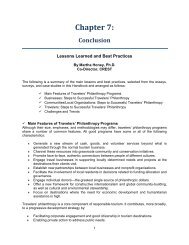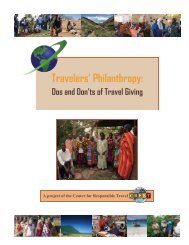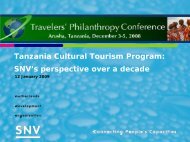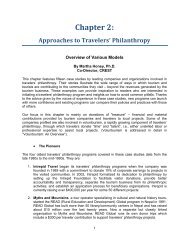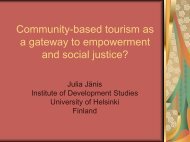Travelers' Philanthropy Handbook - Center for Responsible Travel
Travelers' Philanthropy Handbook - Center for Responsible Travel
Travelers' Philanthropy Handbook - Center for Responsible Travel
You also want an ePaper? Increase the reach of your titles
YUMPU automatically turns print PDFs into web optimized ePapers that Google loves.
little flows directly to community-based ef<strong>for</strong>ts that are working in collaboration with other localstakeholders to solve many of the most pressing issues.Given the scale of the tourism industry, the associated profits, jobs, and local investmentsaccompanied by philanthropy could meaningfully reduce the staggering economic inequalities ofthe contemporary world. Increasingly, partnerships that include individuals, companies, civicinstitutions, and NGOs are needed to augment governments’ ef<strong>for</strong>ts. <strong>Travel</strong>ers’ philanthropyencourages the development of such partnerships and creates a new stream of economicassistance dollars in locales that most need to build local assets and conserve naturalresources.The importance of these new revenue streams and philanthropic vehicles cannot be overstated.Grassroots groups are tackling astoundingly complex and critical challenges. Almost half of theworld’s population lives on less than two dollars per day. The HIV/AIDS epidemic is threateningthe economic prospects of whole countries in Africa, Asia, and elsewhere. Many indigenouslanguages, customs, and cultures are at risk of extinction. Sixty percent of the world’s coralreefs are threatened withdestruction from human activity, 22and dozens of species go extinctevery day. 23 In addition, civil conflictis triggering mass human migrationsthat destabilize fragile communitiesand natural environments. In the<strong>for</strong>eseeable future most of theworld’s population will not knownature in any direct way.The grassroots organizations thatare on the front lines rarely receivedirectly any of the billions of dollarsin development assistance that arechanneled through governmentsTraining at HIV/AIDS clinic, Kenya.Credit: Ogra Foundationand nongovernmental organizations. As a result, new sources of funding, administered locally<strong>for</strong> locally-defined priorities, are desperately needed. This is precisely the locus of mosttravelers’ philanthropy programs, operating as they typically do through partnerships with localbusinesses, individuals, and NGOs in impoverished locales. The programs have tremendouspotential because they also bring together the world’s most affluent people with its poorest, withmutually beneficial outcomes.Globalization has the power to bring greater social justice, economic development, andenvironmental preservation to the world. It can also further marginalize fragile communities andcultures, as well as accelerate the immense damage being done to our planet. As anindispensable and growing element of globalization, travel can be a powerful way to harnessglobalization’s positive potential. <strong>Travel</strong>ers’ philanthropy programs, like those described in this<strong>Handbook</strong>, are demonstrating that enduring partnerships between travelers, local leaders, andtravel-related businesses can strengthen under-resourced communities and help position themto get a fairer share of globalization’s fruits.22 Dirk Bryant, Lauretta Burke, John McManus, and Mark D. Spalding, Reefs at Risk A Map-Based Indicator of Threats to theWorld's Coral Reefs, World Resources Institute, 1998, http://www.wri.org/publication/reefs-at-risk.23 Environmental Literacy Council, “Threatened & Endangered Species,” http://www.enviroliteracy.org/article.php/33.html.9




